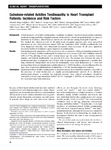Quinolone-related Achilles tendinopathy in heart transplant patients: incidence and risk factors

Ver/Abrir
Use este enlace para citar
http://hdl.handle.net/2183/18122
Excepto si se señala otra cosa, la licencia del ítem se describe como Atribución-NoComercial-SinDerivadas 3.0 España
Colecciones
- Investigación (FEP) [507]
Metadatos
Mostrar el registro completo del ítemTítulo
Quinolone-related Achilles tendinopathy in heart transplant patients: incidence and risk factorsAutor(es)
Fecha
2008-01-08Cita bibliográfica
Barge-Caballero E, Crespo-Leiro MG, Paniagua-Martin MJ, et al. Quinolone-related Achilles tendinopathy in heart transplant patients: incidence and risk factors. J Heart Lung Transplant. 2008;27(1):46-51
Resumen
[Abstract] Background. A high incidence of Achilles tendinopathy—tendinitis or rupture—has been observed after quinolone treatment in lung and kidney transplant patients. In the absence of relevant published data, we aimed to determine its incidence, clinical features, risk factors and outcome among heart graft recipients.
Methods. We studied the clinical records of all adult heart transplant patients who were prescribed quinolones at our center between August 1995 and September 2006. Achilles tendinopathy had been diagnosed clinically, with ultrasound assessment when necessary. In all cases, quinolone treatment had been terminated upon diagnosis of tendinopathy.
Results. During this period, quinolones had been given on 242 occasions to 149 heart transplant patients (33 women, 116 men). Achilles tendinopathy developed on 14 occasions (5.8%; 95% confidence interval: 2.8% to 8.7%), affecting 13 men and 1 woman (mean age: 62 years). Three cases involved tendon rupture, and bilateral tendinopathy was present in 8 cases. The median time between the start of treatment and onset of symptoms was 2.5 days, with 12 patients being asymptomatic 2 months after drug withdrawal. Independent risk factors for tendinopathy were renal dysfunction (p = 0.03) and increased time between transplantation and treatment (p = 0.005). Incidence was not influenced by the type, dose or previous administration of quinolones, or by the immunosuppressive regimen.
Conclusions. Quinolone-related Achilles tendinopathy is frequent among heart transplant patients, especially in the presence of renal dysfunction or lengthy post-transplantation survival. If no alternative anti-bacterial therapy is available for high-risk patients, close clinical surveillance should be warranted.
Versión del editor
Derechos
Atribución-NoComercial-SinDerivadas 3.0 España
ISSN
1053-2498
1557-3117
1557-3117






